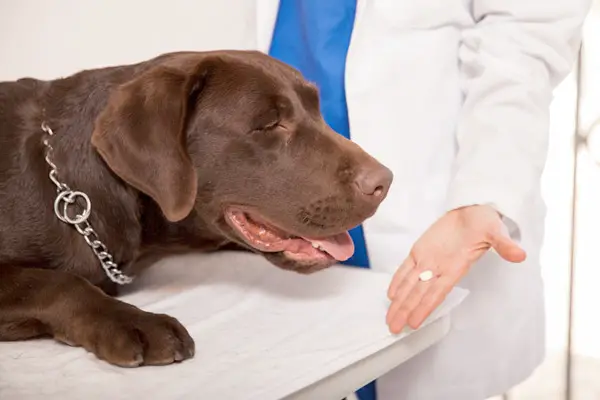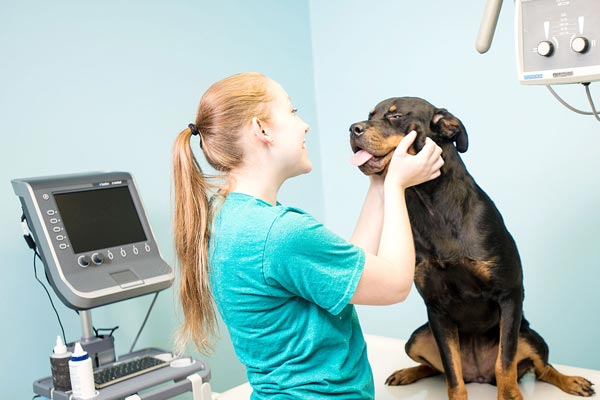Trazodone for Dogs: The Ultimate Guide to a Stress-Free, Happy Pup
Every dog owner has faced this tricky situation at some point: a vacation is coming up, and the thought of leaving your fur baby behind in a kennel is just too heartbreaking.
You’d love to bring your buddy along, but their severe anxiety during travel makes the journey seem like a mission impossible. So, what’s the solution?
Quite a few dog owners dealing with stressed, nervous, or even aggressive pets have found success by medicating their dogs with Trazodone, a drug that has been safely used in humans.
Being your excellent owner, you want to do all the necessary research before making such a big decision for your four-legged friend.
It’s essential to weigh your options and feel confident that you’re making the best choice to give your dog the happiest life they deserve.
Thankfully, you don’t have to spend countless hours scouring the internet. This article is your go-to guide for everything you need about using Trazodone for your anxious canine. So sit back, relax, and let’s dive in!
So What Is Trazodone Exactly?
According to Dr. Debra Primovic, Trazodone treats various behavioral issues in dogs that stem from anxiety and fear, like separation anxiety or stress during vet visits.
The drug acts as an antidepressant that rebalances the chemicals in the brain during emotional trauma.
Trazodone works by increasing serotonin levels, a vital neurotransmitter that influences mood, appetite, memory, sleep, and more.
In humans, people lacking serotonin are more likely to have depression and other mood disorders.
By using Trazodone in canines, the result is alleviating any stress or discomfort triggered by a situation they’re not used to or expecting.
One thing worth noting is that Trazodone and other brands of this medication are only approved by the FDA for use in humans.
Trazodone treats depression, anxiety, and insomnia and can even help recovering addicts through withdrawals.
Although it is not FDA-approved for canines, many veterinarians have legally prescribed the drug and achieved successful results.
Continue reading to learn more about potential side effects reported in canine use.
Are There Any Side Effects?
The veterinarians who prescribe Trazodone to your dog will start them on a small dosage to see how your dog responds to the medication and decrease their risk for potential side effects.
However, like any drug for humans and animals, there are always potential risks.
The Recovery Village reports that side effects to watch out for a while medicating your dog with Trazodone are diarrhea, vomiting, panting, sluggishness, shaking or restlessness, and agitation.
According to professionals, dog parents should wait a few days to see how the medication settles in their dog’s system.
Trazodone is supposed to weaken in reactivity as time goes on. If your dog doesn’t respond well immediately, it’s worth waiting a few days to see if their condition improves.
If your dog is experiencing symptoms more severe than what is listed above, please get in touch with your vet for further guidance.
Rarer but more severe side effects include low blood pressure, trouble walking, and seizures.
Is Trazodone Good For Traveling With Pets?
Trazodone can be an excellent option for keeping your dog relaxed and comfortable during a long trip where they could get anxious from the confined space.
In fact, in one study published in the National Center for Biotechnology Information, dogs who were administered Trazodone after a surgery that would confine them in a cage fared much better than dogs who did not receive any medication.
The results from this study, in particular, are overwhelmingly positive. Over 90% of the dogs either responded moderately or exceptionally well to the medication, and no dogs were reported to have suffered any side effects.
The medication took under an hour to kick in, and the dogs were relieved from confinement anxiety for four hours or longer.
These results make Trazodone an attractive choice for keeping your dog happy during any traveling where they would be confined to their cage or any other confined spaces.
Please note that since this medication may cause your dog to vomit or have diarrhea, be prepared to clean any mess they may make.
Nothing would spoil a road trip more than a stained car seat that stinks up the entire car!
Can I Give Trazodone To My Aggressive Dog?
Trazodone will work to lower your dog’s aggressive behaviors, but it is not a suitable long-term fix.
Dr. Wayne L. Hunthausen explains in a blog that he may administer Trazodone to dogs who exhibit aggressive behaviors during regular vet checkups to minimize any distress and harm done to the doctors and assistants trying to examine the dog.
Dr. Hunthausen believes that dog owners need to train their dogs as puppies to eliminate any aggressive behaviors because that is when they are most open to learning.
However, some people adopt older dogs and don’t want to give them up due to some aggressive tendencies.
If you’re dealing with an aggressive older dog, Trazodone might be an excellent solution to help you safely get through a training period.
While training a dog to correct undesirable behaviors, rewards work much better than scolding.
Instead of only yelling at your dog when doing something wrong, try rewarding them with delicious treats and praise when they exhibit positive behaviors.
Dr. Hunthausen suggests using meats or cheeses since these treats are highly desirable to dogs.
Remember that yelling at your dog can trigger even more aggression from them, so the best thing to do when your dog is aggressive is to walk away and ignore them.
What Are The Dosages For Trazodone In Dogs?
According to Tamara Foss, a cardiovascular technologist who has worked for the ASPCA Animal Poison Control Center for almost two decades, the short answer is that it depends on many different factors!
Initially, your vet will want to start your dog on the lowest possible dosage to minimize their risk of experiencing any negative side effects.
During this period, your dog will likely be prescribed one or more other drugs with Trazodone to achieve the calming effects.
As your dog becomes acclimated to Trazodone, their dosage will increase until it can solve your dog’s behavioral issues.
As a general rule of thumb, most vets will prescribe your dog 3.5 milligrams of Trazodone to be administered to them every 24 hours.
However, the proper dosages for medication can range from 2.5 milligrams per pound to 15 milligrams per pound each day.
Bigger dogs will require more significant dosages to achieve the desired effects. Your vet will also examine how stressed your dog is to distinguish the healthiest dose.
The more severe the anxiety, the higher the dose to rebalance the chemicals in your dog’s brain.
Dogs with constant or frequent mood disorders can be given Trazodone every 24 hours, and vets can also prescribe Trazodone to keep on hand when an owner is anticipating a stressful event.
In the case that you are medicating your dog for special occasions that you know they will experience stress, such as fireworks during the Fourth of July, severe thunderstorms, or a long car ride, veterinarians recommend administering the drug an hour before the anticipated event so that the medication has time to kick in.
Will Trazodone Put My Dog To Sleep?
This depends on how your dog acts when they are relaxed! Some dogs will behave very mellowly and passively, whereas other dogs might feel so good that they can’t help but take a nice snooze.
As long as your dog is still breathing normally, there is no reason to be alarmed if they are taking a nap.
Since lethargy is a common side effect of the drug, your dog may act sleepy for a few hours after taking Trazodone.
Remember that a sleepy dog is much happier than a panicked one!
How Does Trazodone Interact With Other Drugs?
Trazodone can interact negatively with other drugs or alter their potency, so it is always best to inform your vet of any medications your dog is taking if they do not have your dog’s medical history on file.
If your dog has to take diuretics, antibiotics, antifungals, monoamine oxidase inhibitors, aspirin, or any anti-inflammatory drugs, Trazodone might not suit them.
Drug interactions specific to which brands your dog is currently taking are best assessed by your veterinarian, who can tailor any medication to your dog’s needs.
What Should I Do If My Dogs Gets Into Trazodone Or I Suspect There Is An Overdose?
Dogs are like big babies who have an innate gift for getting into things they know they shouldn’t be getting into.
Accidents can happen, and you may find that your dog got into their medication and consumed a high volume.
The first thing to do is to stay calm and not panic. Since Trazodone has a wide range of milligrams that can be safely consumed, so your dog may not be in serious danger.
However, it would be best not to hesitate to call your veterinarian or locate an emergency animal hospital.
If your dog overdoses, it may have a seizure or, in the most extreme cases, it could go into a coma.
You should seek professional help immediately so a veterinarian can evaluate and treat your pet.
I’m Still On The Fence About Giving My Dog Trazodone
Giving your fur baby anything out of the ordinary that can cause uncomfortable side effects can be a scary thing!
Ultimately, your vet, who is familiar with your dog’s medical history, has the best judgment in their case, and they should be more than happy to discuss all of your dog’s options.
If you’re interested in seeing how one dog with severe anxiety during thunderstorms responds to Trazodone, check out this video posted by Guthrie Pet Hospital.
You can see how much calmer and more comfortable this dog appears after getting the drug in her system.
Here Are Some Other Helpful Tips For Giving Your Dog Trazodone
– Trazodone is safe for your pet on an empty stomach or with food. However, if your dog doesn’t respond well or vomits after taking Trazodone on an empty stomach, it may feel better taking the medication with a full stomach.
– If you and your veterinarian decide that Trazodone isn’t effective or you’re uncomfortable with continuing the treatment, be sure to wean your dog off of Trazodone, or they may exhibit withdrawal symptoms.
– If you notice that your dog is feeling better before their treatment is completed, you should still continue to administer their medication until the prescription is finished.
– Although Trazodone is often prescribed to help dogs with separation anxiety, you should never leave your dog unsupervised when starting them on a new medication. Until you know that your dog doesn’t experience any negative side effects from Trazodone, you should be around to keep an eye on them to monitor their condition.
– Since the FDA disapproves Trazodone but is legally allowed to be prescribed to dogs, you may find the brand name and generic versions of the drug in your dog’s medication. Pills can come in 50, 100, 150, and 300-milligram tablets, so carefully listen to your veterinarian’s instructions and read the bottle to ensure your dog is being properly treated.
– Although not as well studied in dogs, men who have taken Trazodone have reported priapism, which is an erection that lasts a long time, so dogs who have not been neutered or are being used for breeding may react differently to Trazodone than other dogs.
Hopefully, this guide has answered all your questions about giving your dog Trazodone.
If you have any more questions or concerns, contact your veterinarian for more information specific to your dog’s needs and medical history.
Here’s to many years of happy and stress-free adventures with your pet!






![11 Best of New York Dog Parks [Free & Paid]](https://www.whatcandogseat.net/wp-content/uploads/2020/06/Best-of-New-York-Dog-Parks.jpg)